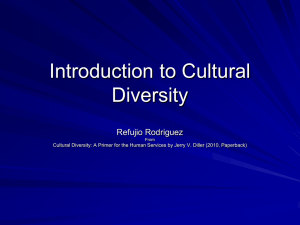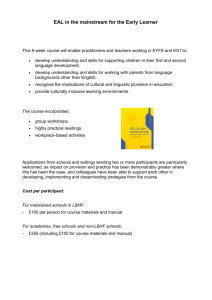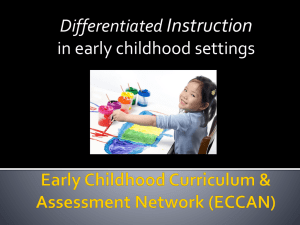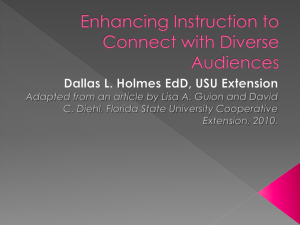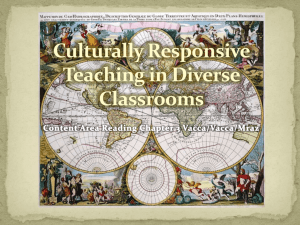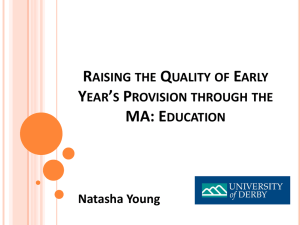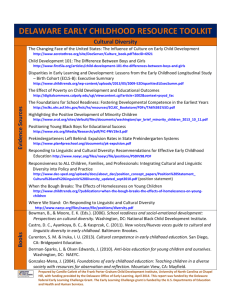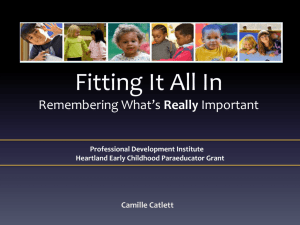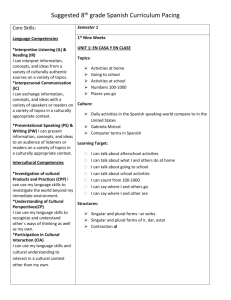IL Early Childhood Diversity Initiative
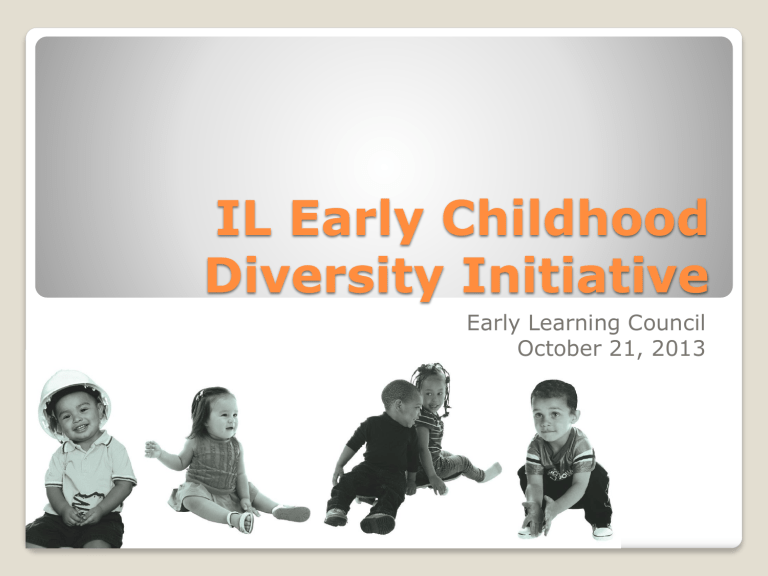
IL Early Childhood
Diversity Initiative
Early Learning Council
October 21, 2013
Project History & Process
BUILD training & technical assistance grant October 2011
IL Leadership Team: IDHS, ISBE &
Gateways
Proposal included QRS standards review assistance & learning table
Broadened the QRS focus to be more comprehensive
In tandem with RTTT & QRIS redevelopment
Project History & Process
1 st stakeholders’ meeting February 2012: small; state agencies, Head Start, City of
Chicago & BUILD project advisors, Aisha
Raye & Luisiana Melendez
2 nd stakeholder meeting July 2012: much larger; advocates, funders, key program organizations, ELC Committee Chairs,
PDAC & Latino Policy Forum
Project History & Process
Guiding Principles document drafted from notes & comments of both meetings
Shared twice with July meeting attendees by end 2012
Shared with IAT April 2013 & ELC Exec
Committee October 2013
Theoretical Starting Points
Multicultural Principles for Head Start
Programs Serving Children Ages Birth to
Five (original & revisited/updated)
Early Childhood Systems Working Group system frames & elements
BUILD/Coffman System Framework
Evaluation & Theory of Change
Diversity (Culturally &) Developmentally
Appropriate Practices (BUILD)
Multi-Cultural World Mono-Cultural
(Dominant Culture) World
Rich language and literacy environment
Rich language and literacy environment supporting dual-multiple language learning
Age-appropriate social and emotional development
Age-appropriate race, language and culture identity development that values child’s culture and models respect for other cultures
Intentional learning environment/curriculum
Parent involvement
Intentional learning environment in context and building on cultural backgrounds
Family/village involvement
Skilled teachers Teachers skilled in and reflecting the race, language, and culture backgrounds of children
Comprehensive health services that meet children’s vision, hearing, nutrition, behavioral, and oral health as well as medical health needs.
Health, Mental
Health and
Nutrition
Early
Learning
Early care and education opportunities in nurturing environments where children can learn what they need to succeed in school and life.
Family
Support
Early identification, assessment and appropriate services for children with special health care needs, disabilities, or developmental delays
Special Needs/
Early Intervention
Economic and parenting supports to ensure children have nurturing and stable relationships with caring adults.
State EC System: Devd. by Early Childhood Systems Working Group
Provider / practitioner support to offer technical assistance and promote professional development
Governance to set policy direction for the comprehensive system
Standards reflect effective practices, programs, & practitioners and are aligned across the system
Monitoring to track program performance and results based on standards
Families
Supported and
Children Thriving Research & development includes cross-system data, planning, analysis, and evaluation
Communications to inform families, providers, and the public
Financing sufficient to assure comprehensive quality services based on standards
Core Elements of EC System: Devd. by Early Childhood Systems Working Group
Evaluation and Self-Assessment
Framework
CONTEXT
Successfully building a political context leads to resources that
COMPONE
NTS
Establish effective programs and services
CONNEC
TIONS
Create better linkages between componen ts
INFRA-
STRUCTU
RE
Create supports that enable programs to operate effectively
SCALE
The system can produce broad impacts for system beneficiaries
From “A Framework for Evaluating Systems Initiatives”, Julia Coffman www.buildinitiative.org
Theory of Change Menu for Systems
Initiatives
CONTEXT COMPONENTS CONNECTIONS INFRASTRUCTURE SCALE
Activities: Activities: Activities: Activities: Activities:
• Improving the political context so it produces the policy and funding changes needed to create and
• Establishing highperformance programs and services within the system that produce results
• Creating strong effective linkages across system components that improve results for system
• Developing the supports systems need to function effectively and with quality
• Ensuring a comprehensive system is available to as many people as possible so it sustain the system
Outcomes:
• Recognition of system need
• Policy changes
• Political will
• Public
Engagement for system beneficiaries
Outcomes:
• New or expanded programs
• Improved program quality beneficiaries
Outcomes:
• Shared goals, standards
• Cross-system training
• Referrals/followups
Outcomes:
• Cross-system governance
• Leveraged use of funding
• Mechanisms for two-way communication produces broad and inclusive results
Outcomes:
• System spread, depth, sustainability
• Shifts in system ownership
From “ A Framework for Evaluating Systems Initiatives” , Julia Coffman www.buildinitiative.org
Illinois Guiding Principles for
Cultural & Linguistic
Responsiveness
Vision: In Illinois, we share a collective vision that each and every child will have early childhood experiences that promote healthy development that respects, promotes, and builds on their racial, ethnic, and other family backgrounds and experiences.
We Believe
Every individual is rooted in culture.
The cultural groups within communities & families are the primary sources for culturally relevant programming.
Culturally relevant & diverse programming requires learning accurate information about the culture of different groups & discarding stereotypes.
Addressing cultural relevance in making curriculum choices is a necessary developmentally appropriate practice.
We Believe
Every individual has the right to maintain his or her own identity while acquiring the skills required to function in our diverse society.
Effective programs for children who speak languages other than English require continued development of the 1 st language while the acquisition of English is facilitated.
Culturally relevant programming requires staff who both reflect & are responsive to the community and families served.
We Believe
Multicultural programming for children enables children to develop awareness of, respect for, and appreciation of individual cultural differences.
Culturally relevant & diverse programming examines & challenges institutional & personal biases.
Culturally relevant & diverse programming
& practices are incorporated in all systems
& services and are beneficial to all adults
& children.
We Are Committed to
Early childhood professionals who understand that developing a child’s first language supports the acquisition of a second language.
Early childhood classrooms that embrace and include a rich range of diversity, allowing all to learn from it, and enhancing all children’s learning and development.
Teacher preparation programs that incorporate the individual and unique needs of each child and families and the experiences they bring to the classroom.
We Are Committed to
Culturally responsive and diverse
programming that incorporates all types of diversity, including but not limited to: gender, culture, language, ethnicity, ability, race and economic status.
Policy interpretation that reinforces families and communities as children’s first teachers.
Diverse state and local organizations
and agencies that are meaningfully responsive to each and every child and family they serve.
We Will Act to
Enable professionals to incorporate the authentic language & culture of the children & families they serve.
Increase professional development opportunities & resources addressing all types of diversity, including understanding stereotypes & biases.
Increase all types of diversity content in
teacher preparation programs.
We Will Act to
Increase & enhance teacher
preparation practicum experiences in diverse settings.
Promote practices in classrooms &
programs that incorporate & address the diverse needs of children.
Use an “all types of diversity” lens whenever we develop & implement
policy, staff our agencies/organizations
& evaluate our programming, systems & services.
Illinois Guiding Principles for
Cultural & Linguistic
Responsiveness
Next Steps
Adopt & distribute the document
Embrace in all of our organizations
Share with staff and add your own “We
Will Act to” statements
Training
Other Ideas
For they are all our children. And we will all profit by, or pay for, whatever they become. --James Baldwin



